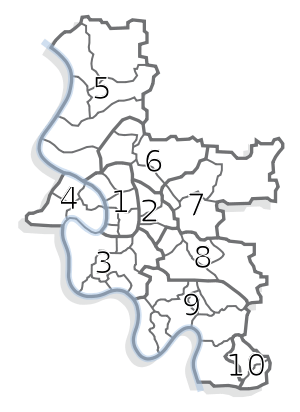Districts of Düsseldorf
The City of Düsseldorf consists of 50 city parts (Stadtteile), which are collected into 10 city districts (Stadtbezirke).[1] Every district has its own local assembly (local parliament Bezirksvertretung) and its own district mayor (Bezirksvorsteher). The Bezirksvertretungen have only advisory roles, they do not have their own budgets. District 4 is the only district on the west side of the Rhine.
Overview
|
 |
|
gollark: I know, right?
gollark: The obvious approach would just be to make a backup of the database each round and operate on that.
gollark: And DELETEs and INSERTs.
gollark: It isn't. But I actually forgot about that and assumed you just wanted to stop UPDATEs.
gollark: I think the SQLite3 Python API has a thing for this.
References
- Landeshauptstadt Düsseldorf Archived 2014-11-06 at the Wayback Machine (in German)
This article is issued from Wikipedia. The text is licensed under Creative Commons - Attribution - Sharealike. Additional terms may apply for the media files.
